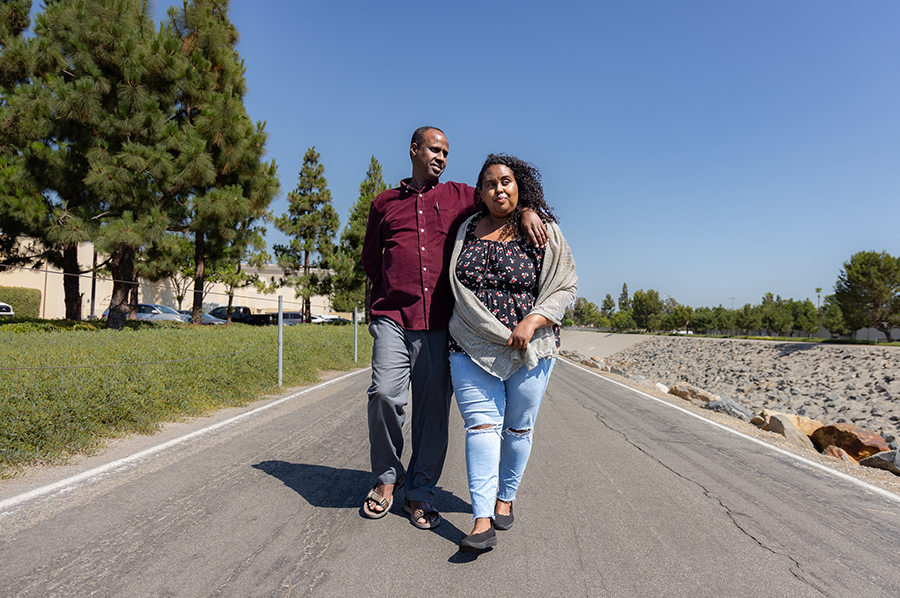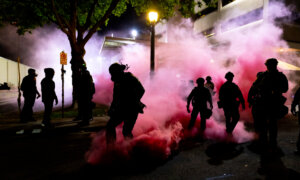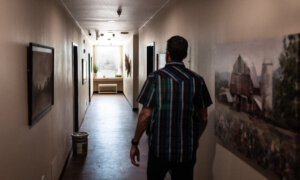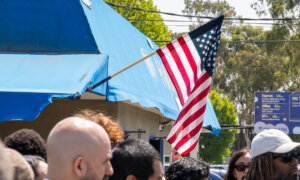IRVINE, Calif.—It was while taking an exam with her fellow elementary school students that Nasri Mohamad, now 44, heard the sounds of gunfire that started the Somali Civil War that led to the eventual collapse of the East African nation in 1991.
“My school was in the Somali capital city of Mogadishu at the time,” Ms. Mohamad told The Epoch Times. “The government troops of then-Somali President Siad Barre tried to fight back against the rebel Islamic rebel factions, but they would soon disperse after he fled south to neighboring Kenya.”
Upon the national military and government collapse, Somalia descended into “complete chaos,” she said, as rival rebel factions fought tirelessly for control, eventually fighting for food supplies and creating a famine for Somalis already struggling to survive.
When the gun battles ultimately arrived in her neighborhood in Mogadishu, her father instructed her family to relocate to the southern port city of Kismayo, where friends had a hotel to accommodate them “until the fighting resolved,” she said.
Known as a “peaceful” man with a doctorate from a Russian university, her father stayed behind to look after the family home and attempt, just as a citizen, to create peaceful transitions with Somalia’s new ruling rebel faction run by warlord Gen. Mohammad Aidid, who was now in control of Mogadishu and its government offices.
Their goodbye would be the last moment she would share with him.
“I remember returning from the beach one day and walking into the hotel where our family and friends were sheltering in Kismayo,” Ms. Mohamad said with tears welling.
She said her father had been brutally tortured and killed by Gen. Aidid’s men.
Ms. Mohamad, her mother, and most remaining family members would soon flee to Kenya, where they waited four years for legal passage into the United States as refugees. They ultimately relocated to the state of Washington.
But for the self-proclaimed “daddy’s girl,” the traumas of the Somali Civil War and the murder of her father created a heavy burden with little relief.
“Imagine being a young child and learning of your father’s torture and death,” she said.
“There was no counsel available at that time for children who experienced that, but I will always remember my father as being an honorable, peaceful man who took care of his family. Oh, how I loved him so.”
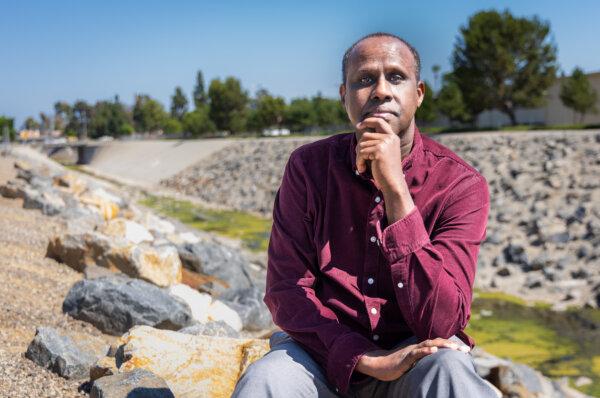
"I was extremely confused," said Joseph Mohamad, referring to when a Muslim friend drove him to a Christian church's parking lot. Above, Mr. Mohamad in Irvine, Calif., on July 8, 2024. (John Fredricks/The Epoch Times)
Freedom of Faith
For her husband, Joseph Mohamad, 47, a Somali Kenyan, childhood rumors about American Christians were soon broken after arriving in Minneapolis in 2004.
Just days off the airplane, he planned on visiting a local mosque with fellow Somali ex-pats when the unexpected happened.
“I remember the parking and traffic near the mosque area to be very busy,” Mr. Mohamad told The Epoch Times. “So when my Muslim friend driving us pulled us into a Christian church parking area, I was extremely confused for a brief minute.”
Pulling into Cedar Valley Church just outside of Minneapolis, he noticed that local church members were providing not only parking for mosque attendees but also a shuttle service to transport them there.
It was the actions of the church and its way of serving the community of a completely different faith that came as a “shock,” he said.
“My whole life I was taught that Christians were my enemies, but here they were letting us park at their church and even giving us a ride to the mosque,” he said. “I will never forget that moment. A simple act that challenged everything I knew about Christians and planted ‘a seed’ for Jesus that would grow forever.”
He would eventually meet his now-wife and relocate to the state of Washington to be with her.
The couple married in 2009 and soon after moved to Southern California.
Shortly before the move, he had begun to question his Islamic faith. He said he started studying the bible and learned about Jesus.
“The more I looked into Jesus Christ, the more I became curious in his character because when I grew up, I was never allowed to ask questions about Islam, and Christianity was looked down upon,” he said.
He said he was taken by the biblical verse of Matthew 5:44-45, which says love your enemies.
“This was something I had never heard before because in my culture, this concept of love was unheard of,” he said.
It was soon after Mr. Mohamad’s conversion that Ms. Mohamad would also commit her life to Jesus. Almost immediately, they said, they felt the need to forgive the men who murdered her father during the Somali Civil War.
“We never had this love and forgiveness that Jesus Christ communicated in the Bible in our previous faiths,” Ms. Mohamad told The Epoch Times. “What you need to understand is that where we are from, believing in Jesus Christ as Lord will get you killed.”
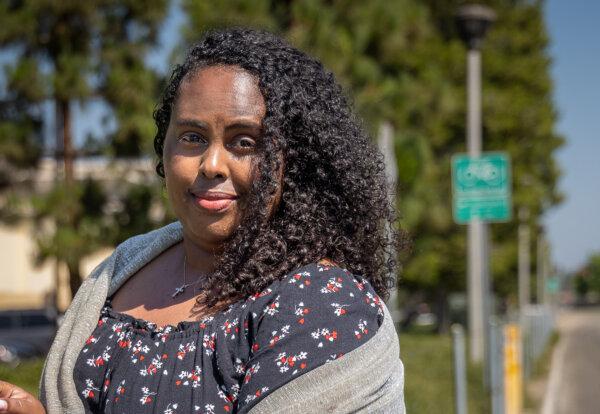
Nasri Mohamad and her husband are “constantly” operating online prayer groups, hosting church services, and even fundraising for Somali Christians. Above, Ms. Mohamad in Irvine, Calif., on July 8, 2024. (John Fredricks/The Epoch Times)
‘Illegal Christianity’
In Ms. Mohamad’s former home nation of Somalia, decades of war, piracy, and Islamic terrorism plagued by Al Qaeda-affiliated groups have crippled the nation and placed it among the top countries for international security threats, economic implosion, human rights violations, and refugee flow. The country has been on the top of the Fragile State Index list—compiled by Global Fund for Peace, an American think tank, since 2007.
The country is also reported to be one of the most dangerous for Christians, according to Open Doors USA, a relief mission that supports persecuted churches on a global scale.
“In Somalia, Christians from Muslim backgrounds are regarded as high-value targets and may be killed on the spot if discovered,” the mission says on its website.
Within the Somali Constitution, the country states, “No religion other than Islam can be propagated in the country,” leaving Christians open to not only imprisonment but also physical injury and murder.
But Mr. Mohamad said the faith is flourishing.
“Even though Christianity is being highly suppressed in Somalia, we know for a fact that the church is growing there,” he told The Epoch Times. “This is despite deaths, family and tribal alienations, and imprisonments of Christian believers even as we speak.”
According to the Somali Bible Society—a worldwide digital bible study that the couple runs—in 2023, there were more than 178,000 Christian practitioners in Somalia, or roughly 1.3 percent of the nation’s 16 million-plus people.
However, according to Open Doors USA, Somalia continues to be one of the most unreached nations by the Christian faith.
Knowing this, the Mohamads “almost immediately” were filled with the yearning to share Christianity with their fellow Somalis in East Africa soon after they became Christians.
As social media took off in the mid-2000s, chat applications providing free, international communication services such as Telegram, WhatsApp, and Signal would become the couple’s main resource in connecting with Somalis back home to not only communicate and pray with Somali Christians but also answer questions Somalis had about Jesus.
“I remember growing up that I was never allowed to ask questions. I had to be the Imam of my local mosque because [questioning] was looked down upon and you could be beaten for it,” Mr. Mohamad said. “So, in making ourselves available for questions, it is the first time many Somalis ever had the freedom to converse and freely ask about who Jesus is without being punished.”
Christians in Somalia report to the couple that there is danger around every corner as they move forward with their faith.
In 2020, one family in communication with the Mohamads in northern Somalia was imprisoned for its Christian faith.
After European government representatives stepped in to intervene, the family was deported to Kenya where it has been ever since.
“The fact they were able to relocate is a rare circumstance for Christians in Somalia,” Ms. Mohamad said. “I think the fact that the story happened to catch the public eye was a blessing to their situation at hand.”
As the Mohamads continue to stay active on social media, the couple are “constantly” operating online prayer groups, hosting church services, and even fundraising for Somali Christians who seek to escape the country after their Christian conversions, even when it comes to using their own money to help.
“We give what little we have to anyone that needs it over there,” Ms. Mohamad said. “When Joseph and I accepted Jesus, we were called to be faithful in everything, including our finances.”
Despite the challenges that Christians in Somalia continue to face with both persecution and a lack of national infrastructure, the Mohamads report that they are seeing “God working” in the nation.
Christian believers that they communicate with daily report that though the religion is illegal in Somalia, they are in touch with believers working in universities, the government, and among national tribes.
“When you persecute Christianity, it grows,” Ms. Mohamad said. “In my journey, I lost my home, my finances, and even some family members along the way, but in all these losses, I have only gained in Jesus Christ, our Lord.”
Currently, the Somali Church is the seventh-fastest growing evangelical church in the world, according to international Christian-prayer ministry Operation World.
Persecuted Christians in Somalia can contact the Mohamads at houseofprayersomalia@gmail.com.
